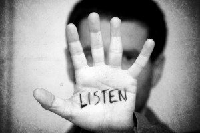Being a Good Communicator
Some people may seem like they are naturally good communicators; they can frame a message to suit any audience, and the message is always received loud and clear. Chances are, that although they are good communicators now, that wasn't always the case. We all need to continually practice the art of good communication.
Ideas to help you become an effective communicator
1) Gain Competence
Gain competence in oral, written, and presentation skills for conveying information using various media.
Many of your foundation or prerequisite courses focus directly on written and/or spoken communication. Additionally, many of your other ESP courses will provide you with opportunities to demonstrate and hone these skills. The importance of being able to articulate your thoughts and ideas effectively and concisely through words is not to be underestimated. Being able to explain concepts and your ideas related to those concepts both orally and/or visually is a constant requirement for success in any job. Our advice:
- Take every opportunity, while doing course assignments or working outside of class, to exercise your communication skills.
- Take advantage of the resources provided in this class to support your endeavors along the way.
- Take advantage of our in-house writing tutor and the tutor.com services available to you as you fine-tune your communication skills.
Being able to articulate your ideas in words, however, is only part of the communication challenge. A good communicator understands and does more than this.

2) Listen to and Learn from Others
Being a good communicator doesn't only require saying the right thing at the right time. It also requires truly listening and understanding your audience and then responding appropriately. Good communicators place listening towards the top of their 'radar' as they reach out and try to understand their audiences and themselves.
Optional "Reading"
If you'd like to become a better listener, take some time to view this tutorial about Effective Listening.
The overview provided on LinkedIn Learning for this tutorial:
Listening is a critical competency, whether you are interviewing for your first job or leading a Fortune 500 company. Surprisingly, relatively few of us have ever had any formal training in how to listen effectively. In this course, communications experts Tatiana Kolovou and Brenda Bailey-Hughes show how to assess your current listening skills, understand the challenges to effective listening (such as distractions!), and develop behaviors that will allow you to become a better listener—and a better colleague, mentor, and friend.
Topics include:
- recalling details
- empathizing
- avoiding distractions and the feeling of being overwhelmed
- clarifying your role
- using attentive nonverbal cues
- paraphrasing what was said
- matching emotions and mirroring
3) Professionalism

Being considered a professional involves:
- understanding what one is talking about,
- regularly producing high-quality work,
- exhibiting high standards of professional ethics, and
- acting as a positive role model in terms of morale and motivation.
Think about the many ways in which you can or will communicate with clients, coworkers, and your professors. Find ways to incorporate the above-listed attributes into the messages you draft, and look for evidence that confirms the importance of these attributes.
Professionalism doesn't mean you know it all
When you are presented with a scenario in which you are asked a question that you do not know the answer to, it is best to say "I don't know, but I'll check on that and get back to you" (or something similar). A client (or anyone you are talking to) will appreciate your honesty much more than you presenting them with incorrect, incomplete, or made-up information.
"...saying “I don’t know” is not a sign of weakness, or unpreparedness, or a lack of leadership. In fact, knowing when you don’t know something -- and being honest about it -- is a mark of a true leader. Unfortunately, in our instant, on-demand, bleat-before-you-think culture, it’s easy to substitute instinct, opinion, and even unfettered bias for certainty. And unfortunately, it infects our personal and political lives as much as it does business." (McKee, 2016)
Read more about The lost art of saying "I don't know".
4) Competence in a language other than English

licensed under CC BY-NC-SA 4.0
Why is this important?
There are two things that should be learned when studying another language. One is the language itself; the vocabulary, grammar, sentence structure and so forth. The second, and of more importance for the ESP student, is the opportunity to shift outside of your own cultural norms. Learning the French language is very different from speaking with someone from France. Speaking with someone from France involves understanding not just the language, but the culture of the language as well. For example, when people walk into shops in Paris, France, they always, always exchange French greetings with the shopkeeper ("Bonjour madame," "Bonjour monsieur") before proceeding to shop or ask questions. To do otherwise (even in English) is considered extremely rude (if their four-year-old knows this, they would say, why don't you?). Also, walking around with a big smile in Paris? No, no, no. Parisians often interpret this negatively, as A) you are laughing at me as if I have something amiss on my person, or B) you are a simpleton. Are you starting to see why some uninitiated Americans might have a non-optimal experience in the City of Light?
All of this still remains important even as more and more people strive to learn English. Author Joe Carroll wrote an editorial in The Business Journal (2005), pointing out that, "More students in China take English as a second language than there are English-speaking people in the entire world." He also states, "If the world's population totaled 1,000 people, the distribution would be as follows: 564 Asian. 210 European, 86 African, 80 South American, 60 North American — meaning the United States, Canada, and Mexico." If you want to read more, Carroll's article, "What's the importance of learning a foreign language?" is excellent (The Business Journal, 2005). This article is over a decade old; if it was important to learn a foreign language in 2005, can you imagine the impetus now?
In other parts of the world, knowing the culture is more important than knowing the language, and sometimes the language specifies the way in which one can communicate with a superior. As an extreme example, we might look at what Malcolm Gladwell (author of The Tipping Point and Blink) wrote about in a book called Outliers: The Story of Success. In the chapter entitled, "The Ethnic Theory of Plane Crashes," he describes a number of scenarios and discusses airline safety from the perspective of cultural communication (in this case, the Korean language).
Evidently, in 1997, Korean Air Flight 801 experienced turbulence and trouble in their approach to Guam. Culturally, the co-pilot did not feel it was his role (as subordinate) to contradict the pilot with his judgment that the plane was about to crash—indeed, linguistically it was nearly impossible. The plane did crash, killing 228 of the 254 people aboard. Here, cultural legacy impinged on the safety of everyone aboard the flight! Essentially, "... Boeing and Airbus design modern, complex airplanes to be flown by two equals. That works beautifully in low power-distance cultures [like the U.S., where hierarchies aren't as relevant]. But in cultures that have high power distance, it’s very difficult." The dynamic of the industry was changed when all pilots and crew were required to speak only in English. Most of us know that English has lost much of its formal/informal verb tense for addressing either a child or the president of a company. This change in cultural norms (which is often built into the language) has allowed the company to fly more safely since the change in language.
Optional Reading
Kiss, Bow Or Shake Hands: The Bestselling Guide to Doing Business in More Than 60 Countries. (It is also available through the Penn State Libraries).